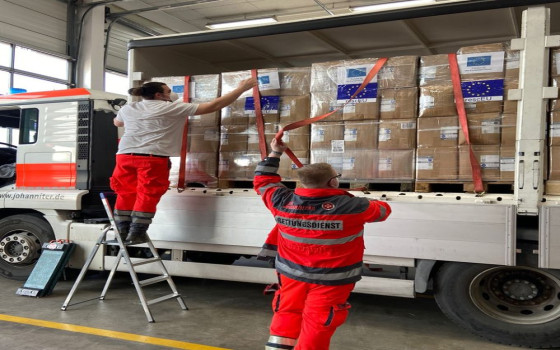
European Union: Allocates €90 million in emergency humanitarian aid to Palestine and Yemen

- Europe and Arabs
- Thursday , 25 September 2025 8:12 AM GMT
Brussels: Europe and the Arabs
The European Commission announced the allocation of an additional €50 million in humanitarian aid to respond to the catastrophic humanitarian situation in Gaza and to meet the growing humanitarian needs in the West Bank. This brings the total EU emergency humanitarian aid for Gaza and the West Bank, including East Jerusalem, in 2025 to €220 million, and to over €550 million since 2023.
According to a European statement issued in Brussels, the statement added, "The first ever famine has been confirmed in Gaza, and massive forced displacement resulting from the ongoing military offensive on Gaza City is leaving families in dire need of food, shelter, healthcare, and protection. In the occupied West Bank, continued forced displacement, severe movement restrictions, and settler violence are resulting in urgent humanitarian needs in the areas of protection, shelter, and access to basic services.
The additional EU funding will help its humanitarian partners on the ground deliver life-saving assistance in both Gaza and the West Bank. Safe and unhindered access for humanitarian workers is vital throughout Gaza, and civilians must be protected wherever they are.
Since October 2023, the EU has organized 77 humanitarian flights and cargo 5,037 tons of relief supplies, including medicines, medical supplies, shelter, water and sanitation, and educational materials, were delivered on behalf of humanitarian partners, EU Member States, and from EU stockpiles. Since 2024, the EU Civil Protection Mechanism has coordinated the medical evacuations of 306 patients across Europe.
The European statement added, "More than 1.9 million people (over 90% of the population) have been repeatedly forcibly displaced in Gaza amid intense Israeli bombardment, including in tents, hospitals, and schools, ongoing ground clashes, and repeated forced displacement orders.
As of 22 August 2025, famine (IPC Phase 5) has been confirmed in Gaza. After months of ongoing conflict, more than half a million people in the Gaza Strip are facing catastrophic conditions. Another 1.07 million people, 54% of the population, are facing an emergency or crisis situation. In the West Bank, the humanitarian situation continues to deteriorate significantly, driven in part by rapid settlement expansion and legalization, which increases the risk of de facto annexation, Israeli military operations, and ongoing attacks by Israeli settlers on Palestinian communities. Settlers have carried out at least 2,300 attacks in the West Bank. Nearly 40,000 people have been displaced since January 1, 2024.
EU Increases Aid to Yemen Amid Worsening Humanitarian Crisis
In a separate statement, the European Commission announced an additional €40 million in humanitarian aid to address the worsening crisis in Yemen and help prevent famine. This brings the EU's total humanitarian support to Yemen to €120 million by 2025 and nearly €1 billion since 2015.
Years of war, economic collapse, and climate shocks have left more than half the population facing severe food insecurity. More than 19.5 million people need humanitarian assistance, and 17.1 million people face crisis levels of food insecurity. Nearly two million children are malnourished, including half a million in critical condition. The health system is on the verge of collapse, with disease outbreaks spreading as facilities close due to a lack of funding.
The EU funding will provide urgent food, nutrition, and health assistance, prioritizing areas most at risk of famine. As an additional component of the assistance, an EU Humanitarian Air Bridge recently delivered more than 432 tons of life-saving medicines and supplies. Thanks to close cooperation with 11 humanitarian partners, this aid reached families across the country.
The EU is the largest donor to the Yemen Humanitarian Response Plan and remains a key partner in UN-led efforts to uphold international humanitarian law and regional stability.
The latest €40 million EU allocation is drawn from its emergency funding reserves, in addition to a further €80 million already allocated this year. A significant portion of the EU's humanitarian aid is supported by cash transfers to aid recipients, the most efficient, effective, and dignified way of delivering humanitarian assistance.












No Comments Found